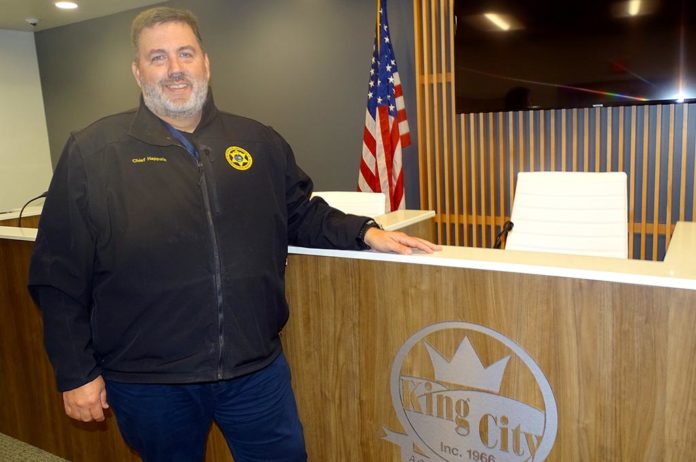King City voters have faithfully approved five-year local option levies twice in the past to support police services, and another levy for police services and public safety is on the Nov. 5 ballot with a twist.
The previous two measures levied 55 cents per $1,000 of assessed valuation, but the current one would levy 63 cents per $1,000 of assessed valuation; it would go into effect in July 2020 after the current one expires in June 2020.
“No. 1, the 8-cent increase is to keep up with inflation, and No. 2, it would provide $48,000 per year more,” said police Chief Ernie Happala. But none of that would actually go toward police vehicles or equipment.
According to Happala, 83 percent of the increase would go to the Washington County Consolidated Communications Agency, commonly referred to as WACCA, which operates the 911 call center in Hillsboro where calls from all over Washington County are answered.
“We’ve been paying a smaller portion – only half of what we should have paid,” Happala said. “It’s sort of a small-community discount, and everyone else has been picking up the slack. It is like slices of a pie, and we are growing and have eclipsed our one percent of ‘talk time’ (the amount of time 911 operators spend on King City calls). When we are over 1 percent for three quarters, our bill will go up, if not this year, then next year.
“We’ve been paying $24,000 a year, but our new bill will be $53,000, which is huge. I’ve known it was coming. Literally, all the increased funding will go to this. We also have safety equipment needs – I want to buy ballistic shields for the officers – and we have two newer vehicles, but the rest are aging, and we need to replace equipment.”
Another issue for the small force is a huge overtime bill because officers frequently have to fill in for each other.
“We have 22 hours of coverage out of 24 now, but one of our officers is on a 15-month military deployment, and we are losing another officer to Tigard,” Happala said. “I am bringing part-time officers up to full time and am hiring a new temporary full-time officer. It is challenging.”
Happala said the department has been lucky in that potential officers have approached King City about jobs rather than the department having to seek out candidates. He admits that serving in King City can be considered a “starter job,” but added, “Most stick around. And if our people are being hired away, that says something about our agency.”
While the police department budget is a big chunk of King City’s general fund, Happala said the citizens get first-class response, and police have the time to see calls from beginning to end.
“That’s the beauty of a small town,” he said. “The beauty of working here is that officers don’t go from call to call to call. We get a lot of quality-of-life calls, and we do a lot of customer service. We try to help people in crisis connect with the right service providers that they might not be aware of, like Meals-On-Wheels. And we have picked up prescriptions and food at Safeway for residents.”
While King City has seen some homeless people, it typically is a summertime issue, and Happala admitted, “We spend a lot of time cleaning up camps down by the (Community) park, but we don’t have much of a problem with car camping. There is a city ordinance against it.”
All officers are going through 40 hours of crisis-intervention training, “but we rely pretty heavily on Washington County Sheriff’s Office mental-health teams to come and help people in crisis,” Happala said.
From March 2018 to March 2019, there were 4,000 calls for service in King City, with 25 percent self-initiated by police, including traffic stops, Happala said. There are 1.7 officers per 1,000 population, and luckily criminal activity is minimal. Happala, who has been with the department for 13 years, can’t even remember the last robbery.
Looking toward the future, as King City annexes land within its expanded urban growth boundary to the west, Happala said that eventually, the police department will double in size, which will be paid for by the increase in taxes paid by the new residents.
“This is a great place to live,” Happala said. “It’s all good stuff.”
The levy on the ballot would cost property owners approximately $7.88 per month or $94.50 a year on a house assessed at $150,000.






















